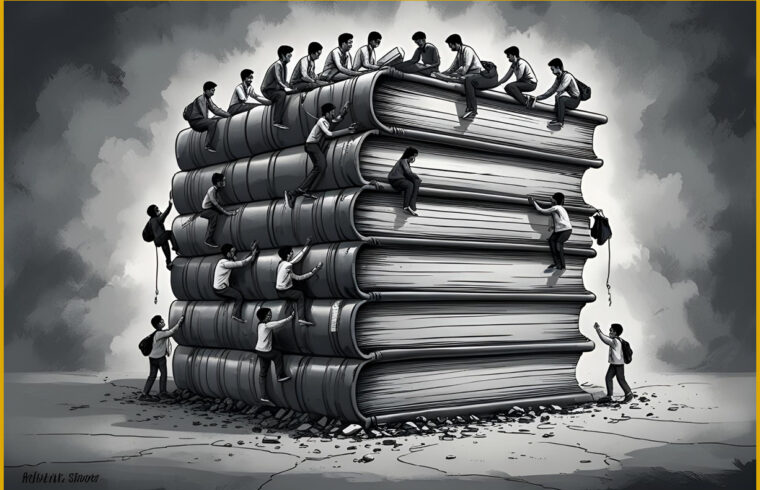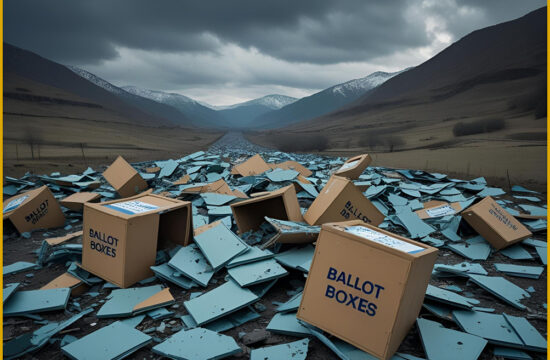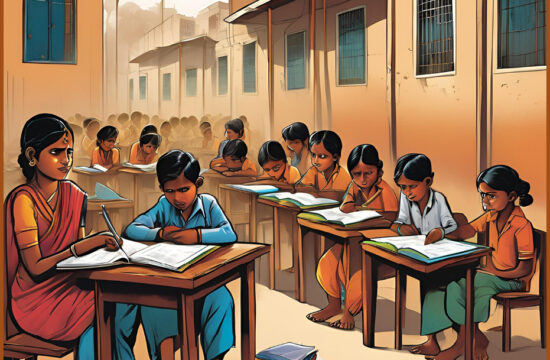Sombhojen Limbu
Assistant Professor, Kathmandu University School of Law
Email: sombhojen.limbu@ku.edu.np
picture: Created with AI
[Abstract]
Nepal has been making consistent efforts to move from traditional to formal justice processes by gradually codifying laws, offering quality legal education and strengthening the integrity of the legal profession. Although legal education is progressing, it is struggling to gain momentum and credibility in the country. The same applies to the legal profession, which is only in its early stages. Universities are committed to teaching quality legal education to meet the demand for students and introduce a global perspective. The legal profession is gradually becoming a family profession where the descendants of judges and lawyers follow footpaths. The concern authorities have introduced relevant laws in order to ensure equality legal education and maintain professional integrity. However, these laws are yet to be not properly enforced to achieve desired objectives. Addressing some of these issues, so it offers an over view of legal education and legal profession in Nepal.
[Keywords] Legal Education, Practitioners, Integrity, Governing Bodies, Council
I. History of Legal Education
Nepal’s legal system has its roots in the religious lore of Hinduism and so, until recently, there were no formally established specific guidelines for legal education.
The beginning of legal training was the Shresta Pathsala, established in 1905. It was an elementary school for legal training to produce trained clerical-level manpower. In 1927, it was reformed and expanded its teaching to math, essay writing and general knowledge of rules and laws. Those who passed the exam (ChharPase) were offered a role as administrative clerks (Khanal [2002]at 457).
In 1954, Kathmandu Law College was established, offering a Bachelor of Laws program in affiliation with Patna University of Bihar, India (Osti [2019] at 790). The designs, contents and objectives of its courses were based on the Indian legal education system. This program ran until Nepal introduced the New Education System Plan (NESP) in 1971.
Tribhuvan University (TU) which was established in 1959, Kathmandu Law College offered the same affiliated legal education program until, TU converted Institute of Law into faculty of law, it became faculty of law. Then TU revised course contents, objectives and curricula into an integrated program to cover the history of Nepalese laws and legal principles. Even now, TU plays a pioneering role in educating and providing the legal resources required in the judiciary, government offices and private practices.
The NESP major goals would be to produce quality human resources in multiple sectors for nation buildings therefore all colleges and private education institutions were brought under the control of TU guidelines. In 2025, there were 12 universities existed in Nepal however some new universities are waiting to be approved by the Parliaments of Federal or Provinces. Under Nepal’s federal system, the Federal and Provinces shall have the enumerated power to establish universities.
1. University Education in Law
With the struggle to develop Nepal’s legal system, there have been momentous reforms to enhance the quality of its legal education. Within the last 60 years, nine out of the 12 universities in Nepal have introduced legal education programs. The following universities offer combined legal degree programs: Tribhuvan University (since 1959), Far-Western University (2010), Kathmandu University (1991), Purbanchal University (1994), Rajarshi University (2017), Nepal Open University (2016), Lumbini Bouddha University (2005), Mid-Western University (2010) and Pokhara University (1997). The Nepal Law Campus, constitutes in TU, offers a five-year combined Bachelor of Arts & Bachelor of Laws (BA, LLB) program in addition to the standalone LLB degree. TU offers a Master of Laws in Corporate, Constitution, Criminal and International Laws and a PhD program in Laws. Kathmandu University School of Law was established in 2013 and offers a combined five-year BB.M/LLB Bachelor of Business Management and Law degree. It has recently introduced a second combined degree, BEc/LLB Bachelor of Economics and Law degree, and also offers a Master in Energy and Infrastructure Laws. Kathmandu School of Law is a private college affiliated with Purbanchal University and offers a five-year BA/LLB program and a Master in Human Rights, Criminology and Corporate Laws. National Law College, affiliated with TU, offers the BA/LLB program and Master in Laws. Nepal Open University offers a three-year LLB program. Some other universities have also offered undergraduate Law programs.
As many of these programs above are relatively new for some Universities and students have not graduated yet. They have taught a primarily theoretical nature of the courses, with clinical and practical knowledge of legal practices. Each university teaches law subjects, courses, and contents as decided by its own academic council instead of coordinating with the subject committees of other universities. Earlier Nepal Bar Council (NBC) has forwarded to the Parliament a proposed amendment to the provisions of the Nepal Bar Council Act (1993). The Bill proposes that universities’ legal education curricula be unified and the evaluations and monitoring of the quality of teaching remain under the authority of the NBC then it has been approved. The NBC emphasizes the importance of a unified law curriculum and consistent teaching quality in universities for the bar exam. It becomes NBC jurisdiction to monitor and instructed unification to the same curriculum, including courses and contents for law schools in order to ensure the quality of legal education.
The non-available of specific specialization faculties have also hampered the ability of the universities to offer quality courses that explore to challenges new global areas of legal education, such as medical laws, artificial intelligence laws, etc. However, a few universities have expanded their academic faculties and students exchange programs with overseas universities, which further enhances the quality and variety of courses offered in legal education. University students have also participated in mooting and other law-related competitions both inter-university and overseas. These opportunities exposed students to new methods and innovative ways of learning and expanding their legal knowledge into overall contribution for a quality legal education.
Those who have graduated with an LLB degree are eligible to sit the Nepal Bar Council (NBC) exam to obtain a law practice licence. NBC does not have a separate formal curriculum for the bar exam but periodically selects specific contents, subjects and courses for the bar exam. Usually, the law schools run voluntary bar exam preparation classes. However, there has been an open debate about the need to reform the bar exam module to ensure those who pass the exam would be competent in legal professionals. Thus, NBC has often received suggestions by legal practitioners, government offices, and universities that it would introduce a mandatory formal training courses prior to selecting an eligible candidate to sit the bar exam.
2. High School Legal Education
Since the introduction of a federal model of government in Nepal in 2015 and as Nepal rolls out additional levels of government in each province and municipality, the need for legally educated and trained human resources has increased. As a result, a new stream of law-related subjects has been introduced under the Higher Secondary Education Board (HSEB) for students in classes 11 and 12 (it says +2 courses). The National Examination Board (NEB) monitors and evaluates the curricula and quality of these courses including legal education run by HSEB. It has opened up basic-level legal courses for a new generation of students. It helps to improve legal knowledge and fosters adherence to the law enforcement institutions and the private sector.
II. Legal Profession in Nepal
The legal system in Nepal has been through a rapid phase of development over the last decades, transitioning from a Kingdom to a Republic, from customary to formal laws, and from
non-codified to a codified system of laws. Civil and Criminal Procedure Codes were introduced in 2018 and have replaced the Muliki Ain (National Code which encompassed all rules governing Nepali society). These changes, combined with an increasingly regulated society, have resulted in a significant shift in the legal profession in Nepal. Traditionally, dispute settlements and legal resolution were in the hands of village elders and local government representatives, with very little reference to the formal justice process. So many people with legal training choose to be public servants or government administrative officials and courts officials. Such legal knowledge has gradually expanded to other areas as well.
Over the last decades, the number of private lawyers has increased significantly in the corporate and human rights sectors. A law firms are started to register in Nepal and they have enlarged their scope of practice to a global level in connection with overseas law firms. Such law firms’ legal service competency has expanded considerably despite to lack of integrate standard of professional ethics. However, a signal overseas law firms is not registered yet in Nepal.
1. Governing Bodies
Nepal Bar Council (NBC)
Supreme Court used to be responsible for issuing licences, keeping records of lawyers and taking disciplinary actions against lawyers, but this role was transferred to the NBC when the Nepal Bar Council Act entered into force in 1993. The ex- ecutive body of the NBC comprises 11 members: the Attorney General, the Chairman of the Nepal Bar Association (NBA), the Registrar of the Supreme Court, the Dean of the Faculty of Law at TU, two lawyers nominated by the NBA and other members elected by lawyers to represent different provinces (Nepal Bar Council Act 1993, s4).
In addition, legal profession NBC has also been monitoring and evaluating the law curricula and quality of teaching at universities before assisting eligibility to seat at exam. The aim is ultimately to improve the quality of legal education at universities and integrity the bar exam.
The primary duties of the NBC are (s 8):
- Conducting the Legal Practitioners Exam to issue licence for legal practice,
- Keeping records of law practitioners,
- Providing opportunities for the professional development of legal practitioners and
- Reviewing and investigating professional behaviour of legal practitioners for compliance with the Code of Conduct and taking relevant disciplinary action.
Nepal Bar Association (NBA)
The NBA, the federal organization for practising lawyers, was established informally in 1956, when legal education in Nepal was still in the early stages of development. It was formally registered as a professional organization in 1963 under the National Guidance Act 1961.
The NBA is the professional umbrella organization for lawyers and it constitutes bar units such as Supreme Court Bar, 18 High Court Bars, the Special Courts Bar and 77 District Court Bars across Nepal. Its role is to ensure quality professional legal services for clients along with professional integrity. It also campaigns for the provision of access to justice, pro bono legal services, alternative dispute resolution, etc. It has played a significant role in enhancing the quality of justice, enforcing the rule of law, and ensuring quality legal education for the nation. It has a mandate to raise issues and concerns regarding legal professional efficiency and credibility.
2. Registration of Legal Practitioners
Legal Practitioners Exam
Those who have graduated law degree at university are eligible to sit the Legal Practitioner Exam (commonly known as the Bar Exam) conducts by Nepal Bar Council. The Legal Practitioner Exam consists of a written section including multiple choice questions, short answer questions and legal drafting questions, and an oral (viva voce) section to test a candidate’s ability to argue a case. The Bar Exam Committee formulates exam’s questions with particular subjects, contents and an evaluating module for the license exam both the written and the interview as per a decision of the NBC.There is an example for non-eligibility candidate to sit in the bar exam who obtained due to insufficient courses credits in a law degree. The Bar Exam Committee would decide if dispute arise in course credits for a person eligible or not to sit in the exam.
Admission to Legal Practice
When the regulation of lawyers was under the Supreme Court, a licence to practise law was awarded based on the candidate’s qualifications and experiences. At the time, foreign citizens were also able to obtain a licensee; now they are explicitly non-eligible for admission to a legal practice in Nepal. However, in specific cases if permission is granted by bench, foreign citizens who are registered as legal practitioners in a foreign country may plead a case before the courts (NBC Act 1993, s 25).
A Nepali citizen who has passed the Legal Practitioners Exam held by the NBC, has not been convicted of any criminal offence involving moral turpitude, and meets one of the following criteria can be admitted (registered) as a legal practitioner (NBC Act 1993, s17):
- A person who has worked for at least five years after obtaining a Bachelor’s Degree in Law as a judge, government advocate or Gazette Officer in the Legal Service or a teacher of law; or
- A person who has practiced as a Pleader (Abhiwakta) for seven years and has a Bachelor’s Degree in Law; or
- A person who has practiced as a Pleader for ffifteen years;
- A person who has a Bachelor’s Degree in Law.
One of the above qualifications is sufficient to be registered as a legal practitioner as per Nepal’s NBC Act 1993.
A Full Bench decision of the Supreme Court shall confer the title of Senior Advocate on a legal practitioner who has ‘helped the courts and society by practising as a legal practitioner in the Supreme Court or High Courts for at least 15 years’ (NBC Act 1993, s 21). As of now, 581 senior advocates and 21,557 advocates have obtained licence to practice law in Nepal.
The Act provides for special privileges of a legal practitioner (s 24) in that no legal practitioner may be arrested in a civil case concerning any claimed amount or penalty when s/he is to present, plead and argue on behalf of a party to the case. No defamation charge may be filed against a legal practitioner on the basis of what s/he has argued in a case.
3. Professional Code of Conduct of Legal Practitioners and Disciplinary Action
Full Bench of the Supreme Court passed the Rules of Professional Code of Conduct for Legal Practitioners (CCLP) in 2023. The CCLP includes the duty and responsibility of lawyers to be independent, ensure the integrity of the profession and ensure harmonious relations between colleagues, court staffs and lawyers. It restricts the advertisement and promotion of legal professionals. It also prohibits lawyers from practising in courts if they are elected as a Member of Parliament, Member of Provincial Government, Chairman or Vice-Chairman at local government level. A retired Supreme Court judge shall be restricted from practising in courts. A retired High Court judge is restricted from appearing as a practitioner in the same court where s/he served as a judge.
The CCLP also covers conflicts of interest and ex-parte communications with judges. If a lawyer violates the CCLP provisions, a party may submit a complaint to the NBC’s Disciplinary Committee for necessary action against the lawyer
The NBC is responsible for taking disciplinary actions against legal practitioners. Complaints are examined by the Disciplinary Committee; it has similar powers to the court in relation to issuing summons and gathering evidence. The NBC can issue three types of punishment if a legal practitioner is found guilty: i) reprimanding an offender; ii) suspending an offender from practice for a specified period; or iii) cancelling an offender’s licence to practice law (NBC Act 1993, s 11(3)). Complaints application against lawyers has increased to NBC however a few disciplinary actions have taken against in such applications to legal practitioners by the Disciplinary Committee. Recently submitted (but not yet approved) proposals to amend the Act include a strong provision that if a legal practitioner violates the code of conduct in non-recoverable losses or engages in misleading conduct in cases, then the lawyer may be punished by imprisonment and fines. NBC and CCLP have the same objectives to upheld integrity, credibility for lawyers‘ profession and take necessary disciplinary action who violate professional ethnics.
If it is subsequently proven that the person was disqualified from being a legal practitioner prior to obtaining a licensee, the Council may cancel the license of such a legal practitioner (NBC Act s. 19).
4. Foreign Lawyers in Nepal
As mentioned above, foreign citizens are not eligible to obtain a licence as a legal practitioner in Nepal. However, foreign lawyers have increasingly worked in different capacities in Nepal. Many foreign lawyers have worked on development activities and advocacy campaigns for local and international non-government organizations (I/NGOs), with the permission of local authorities. Some foreign lawyers have worked as consultants in association with private law firms to support clients in areas of foreign investment projects. Overall, the number of foreign lawyers in Nepal has consistently increased; although they are generally remaining barred from practising in courts. However, as mentioned above, a legal practitioner registered in a foreign country may plead in a case before the Nepali Courts in specific cases if permission is granted (NBC Act 1993, s. 25(2)).
5. Notary Public
A person with a notary public certificate has the authority to translate papers and certify documents for the general public (Notary Public Act 2007 s 5). Persons eligible to be a notary public shall have continuously practiced law for at least seven years and have retired from a position of at least under-secretary gazette officer in the judicial service (s 12). For a notary to act as a translator that person must pass a written exam held by the Notary Public Council (s. 11). A person who is not a Nepali citizen shall not be eligible to be a notary public (s. 13 e).
The Notary Public Council has the authority to monitoring and supervising notary public activities and functions (s.31). If a notary person violates professional guidelines they may be punished with three years‘ imprisonment and up to 150,000 Nepalese rupees or both imprisonment and fine(s.33).
6. Legal Aid Lawyers
A legal aid lawyer may provide legal services for those clients who are unable to protect their legal rights due to financial and social stigma reasons and in order to ensure access to justice. The legal aid lawyers provide limited support to those who cannot afford legal representation in a case. The Legal Aid Committee will prepare separate lists of panel lawyers from among the members of the NBA for each different subject areas or type of cases to provide legal aid to the indigent person (Legal Aid Act 1997 s.5). Unit Bars of the NBA, in coordination with the respective courts, selected the panel of legal aid lawyers. As demand for legal aid services has increased due to mandatory access to justice, some private lawyers and I/NGOs may offer the same services for indigent clients. Due to delays in court procedures and for reasons of poverty, many clients are unable to pay lawyer fees.
The Constitution of Nepal 2015 (art. 20) states that indigent parties shall have fundamental rights to free legal aid in accordance with the law. It is thus mandatory for the state to assign a legal representative for indigent clients in a case.
7. Judges
The three layers of courts in Nepal are Supreme Court, High Courts and District Courts (Constitution of Nepal 2015, art. 127). There are also Special Courts at the equivalent level to the High Courts. A practitioner lawyer is an eligible to be a career judge in all Courts, but the appointment procedure is different from that of a career judge in each court. The Judicial Council exercises exclusive power to appoint a practitioner lawyer to be a career judge in the respective courts. A legal practitioner who has consistently practised for at least eight years, in District Courts (art. 149(2, C)) or 10 years in High Courts (art. 140(2)) is eligible to be a career judge. A prospective District Court judge who meets the qualification must sit a free competition exam and s/he must pass the written and interview exam conducted by the Public Service Commission in coordination with the Judicial Council. Only 40 percent of candidates involves in competition out of total requirement. The Judicial Council shall have exclusive power to appoint a High Court judge from a pool of eligible lawyers. No specific percentage is prescribed for practitioners to be a career judge at High Court. As for the Supreme Court, a practitioner must have at least 15 years of continuous legal practice or be a Senior Advocate to be eligible for a career judge(art.129(5)). A Supreme Court judge shall appoint by the Chief Justice from a law practitioner only after their name were approved by Parliament hearing committee and such prospective names forwarded by Judicial Council of Nepal.
Bibliography
Legal Education in Nepal: Three Day National Seminar (December 24-26, 1992), Seminar Proceeding Report.
Khanal, Rewati Raman, Nepali Kanooni Itihas ko Rooprekha [Historical Outline of Nepalese Law] (2002).
Limbu, S, ‘The Federal Democratic Constitution and Constitutionalism – Its roadmaps to deliver social welfare state in Nepal’ (Politeknik International, 4 May 2023) <https://politeknik-international.org/pi5322/> accessed 28 August 2024.
Limbu S,‘A Critical Review of Proportional Representation for Social Justice under Article 42.1 of the Constitution of Nepal 2015; Challenges towards its Implementation’(2022) 9(1) International Journal of Social Sciences Arts & Humanities <https://www.crdeepjournal.org/wp-content/uploads/2022/02/Vol-9-1-2-IJSSAH.pdf> accessed 28 August 2024.
Nepal Bar Council, https://nepalbarcouncil.org.np/en/examination-committee/ Nepal Notary Public Council,<www.notarypublic.org.np> accessed 28 August 2024.
Nepal Bar Association, https://nepalbarassociation.org.np/
Osti, P, Hamro Kanoni Itihash Nalibeli, Kirat Kal Dekhi 2078 Samma (A details of our legal history from Kirat Dynasty to 2019 A.D] (Pairabi Parkashin 2019).
University Grant Commissions,<https://www.ugcnepal.edu.np/> accessed 28 August 2024.
Legislations
Constitution of Nepal 2015.
Legal Aid Act 1997.
Nepal Bar Council Act 1993.
Notary Public Act 2007.
Rules of Professional Code of Conduct of Legal Practitioners, 2023.
Tribhuvan University Act 1992.
University Grants Commission Act 1993.











